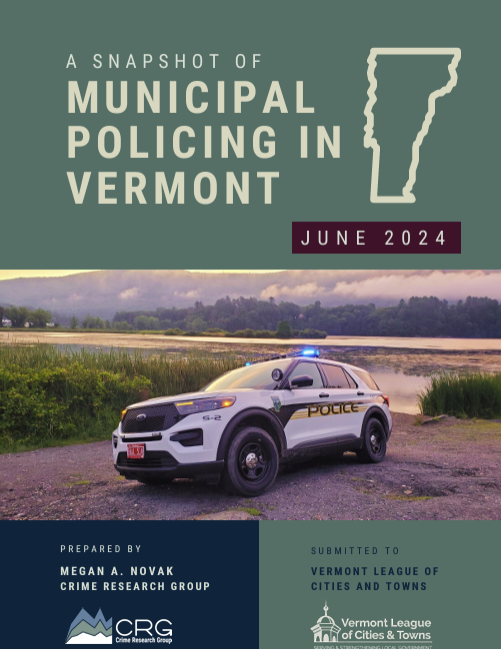This week, the Vermont Legislature wrapped up for the year after passing no fewer than nine bills directly related to improving public safety. These bills – dealing with car theft, repeat offenders, law enforcement officer accountability, restorative justice, and safe injection sites – try to balance accountability for breaking the law with compassion for the root causes of so much of Vermont’s criminal activity: mental health challenges, poverty, and drugs. The 53 city, town, and village police departments run by VLCT members will be the tip of the spear in our state’s efforts to turn the words of these new laws into actions. A new report issued by VLCT, “A Snapshot of Municipal Policing in Vermont”, demonstrates their readiness to do so, but also suggests that more must be done to give them the tools necessary to enforce our existing laws, never mind new ones. Download the full report here.

Many Vermonters are surprised to hear that such a small number of our cities, towns, and villages operate police departments. The super majority of Vermont communities rely on the Vermont State Police and county sheriffs for primary law enforcement coverage. Obviously that system meets the needs of some communities. But more often than not, they rely on these other resources because it’s economically and operationally infeasible to run a department of their own. Even some of our mid-size communities have decided running a police department is impossible, resulting in some smaller agencies dissolving.
"We are not surprised by the researcher’s findings as these are the conditions many police departments have seen over the last few years and we will work diligently to partner with VLCT to improve policing in Vermont.” — Loretta Stalnaker, President of the Vermont Association of Chiefs of Police and Royalton Police Chief
VLCT commissioned the municipal policing report because we are increasingly hearing from communities that recognize the need to provide enhanced public safety services, especially as they perceive an increase in crime, but don’t have the resources to address it. As communities like St. Albans and Richmond look to regional solutions, VLCT decided it was time to conduct an analysis of the unique challenges faced by municipal chiefs, officers, and the legislative bodies that employ them. The answers didn’t surprise us, and they may not surprise you.
Our research found four overarching concerns of municipal police departments:
- Low or inadequate levels of staffing
- Inadequate resources (especially budgets)
- Reliance on police to respond to mental health, substance use disorder, and unhoused populations
- Increase in drug related crimes and theft/larceny
Earlier this month, VLCT and the contractor that worked on the report, Vermont-based Crime Research Group, presented these findings to the Vermont Association of Chiefs of Police. Many of the chiefs had been involved in the research, which included interviews with 10 municipal chiefs, 11 municipal leaders responsible for oversight of 11 different departments, and 88 survey responses from law enforcement officers and municipal officials. The chiefs in attendance appreciated seeing their concerns documented by VLCT, but more importantly seemed to value the affirmation that their concerns mirrored those of the officers they lead and the selectboard members, town managers, and city councilors who oversee them.
Following release of the report, President of the Vermont Association of Chiefs of Police and Royalton Police Chief Loretta Stalnaker said "We are not surprised by the researcher’s findings as these are the conditions many police departments have seen over the last few years and we will work diligently to partner with VLCT to improve policing in Vermont.”
This year’s legislative action on public safety directly addressed several of the report’s findings. Most notably, new laws targeting repeat retail theft, car theft, and drug-related crime should give officers new tools to effectively combat a rise in crime. However, it remains to be seen if prosecutors and the judicial system will exercise these new tools effectively.
VLCT has previously adopted a set of public safety principles that we believe must be addressed to keep our communities safe and our municipal police departments effective. In addition to our 2023/2024 Municipal Policy, in 2022 VLCT’s Board of Directors adopted a Proposal to Improve Municipal Policing that largely called for many of the reforms that occurred this year, and more. “A Snapshot of Municipal Policing in Vermont” comes just in time to educate VLCT’s Public Safety Policy Committee – a group of ten or so municipal officials who have volunteered to help draft VLCT’s positions on public safety – as it begins its work to establish our 2025/2026 Municipal Policy for the next legislative biennium. These four fundamental findings will be the basis for our efforts in the coming years to improve municipal policing.
One of the unique elements of being part of VLCT is that every city and town gets a say in what our final municipal policy positions are. That’s what makes it so powerful when we invoke it in policy debates in the State House. I hope you’ll show up to our annual meeting on October 1 to see how this report turns into action at Town Fair.